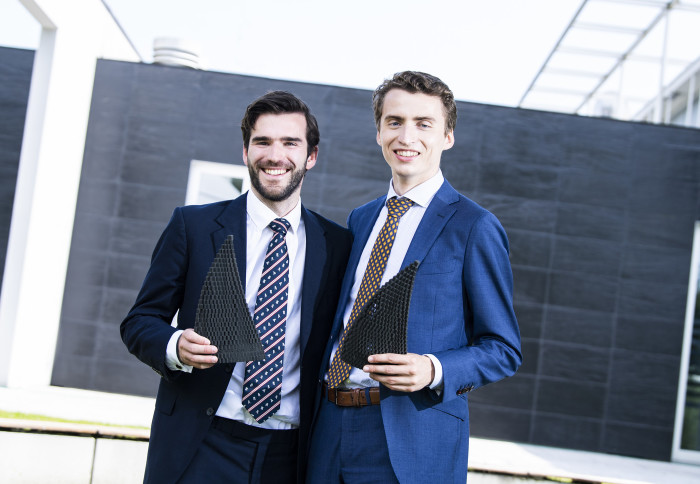Imperial alumni win top prize at Young Inventors award

Two former Imperial students have been honoured by the European Patent Office (EPO) for an AI-recycling technology first conceived at the College.
Environmental engineer Victor Dewulf and computer scientist Peter Hedley were awarded first place in the inaugural Young Inventors prize for developing a recognition and sorting system that can help waste management facilities quickly and accurately separate rubbish to ensure that valuable materials can be recycled.
The system has been rolled out to recycling facilities in the UK and Europe through their London-based start-up Recycleye.
António Campinos, President of the European Patent Office, said: “Victor Dewulf and Peter Hedley are using cutting-edge AI technology to tackle a substantial problem – how to drastically reduce our waste.
“By increasing the likelihood that waste will be recycled, their innovation contributes to a cleaner world for us all and this is exactly the type of sustainable venture that the Young Inventors prize was set up to recognise.”
Automating the waste industry
The invention was conceived when Victor and Peter were at Imperial, studying master's degrees in Environmental Engineering with Business Management and Computer Science respectively.
Victor visited a recycling facility as part of his course, where he was struck by how labour-intensive waste sorting was, making the process prohibitively expensive for companies.
"Applying computer vision and new technologies like robotics means that we can start accelerating the automation of [the waste] industry." Victor Dewulf Chief Executive Officer of Recycleye
This inspired him to write a thesis on waste sorting automation using computer vision, which was developed into a prototype for a computer vision-powered waste recognition system in 2019.
Victor said: “Applying computer vision and new technologies like robotics means that we can start accelerating the automation of [the waste] industry.
"Ultimately that means accelerating our economy's transition to a circular economy to the point where our removal chains can be merged back into our supply chains.”
The Young Inventors award was created by the EPO to honour innovators aged 30 years old and under, offering a cash prize to inventors who have developed solutions that contribute to the United Nations Sustainable Development Goals and positively impact society.
Victor and Peter will receive €20,000 as one of two first-prize winners, alongside Erin Smith, a US-based researcher who developed an AI-powered app that uses video footage to enable early detection of Parkinson's disease.

The Recycleye system consists of two parts – a waste recognition system that takes photos of passing waste and sends them to an algorithm, which then ranks them in terms of picking priority, and a robotic arm that picks up and places the waste for sorting.
The Imperial alumni developed the system in a garage at Peter’s parents’ home using a camera, a treadmill and a pile of rubbish, before founding their company in 2019.
Recycleye has so far deployed 17 vision systems and five robot arms and raised millions of pounds in funding for its work.
Main image credit: European Patent Office.
Article text (excluding photos or graphics) © Imperial College London.
Photos and graphics subject to third party copyright used with permission or © Imperial College London.
Reporter
Conrad Duncan
Communications Division